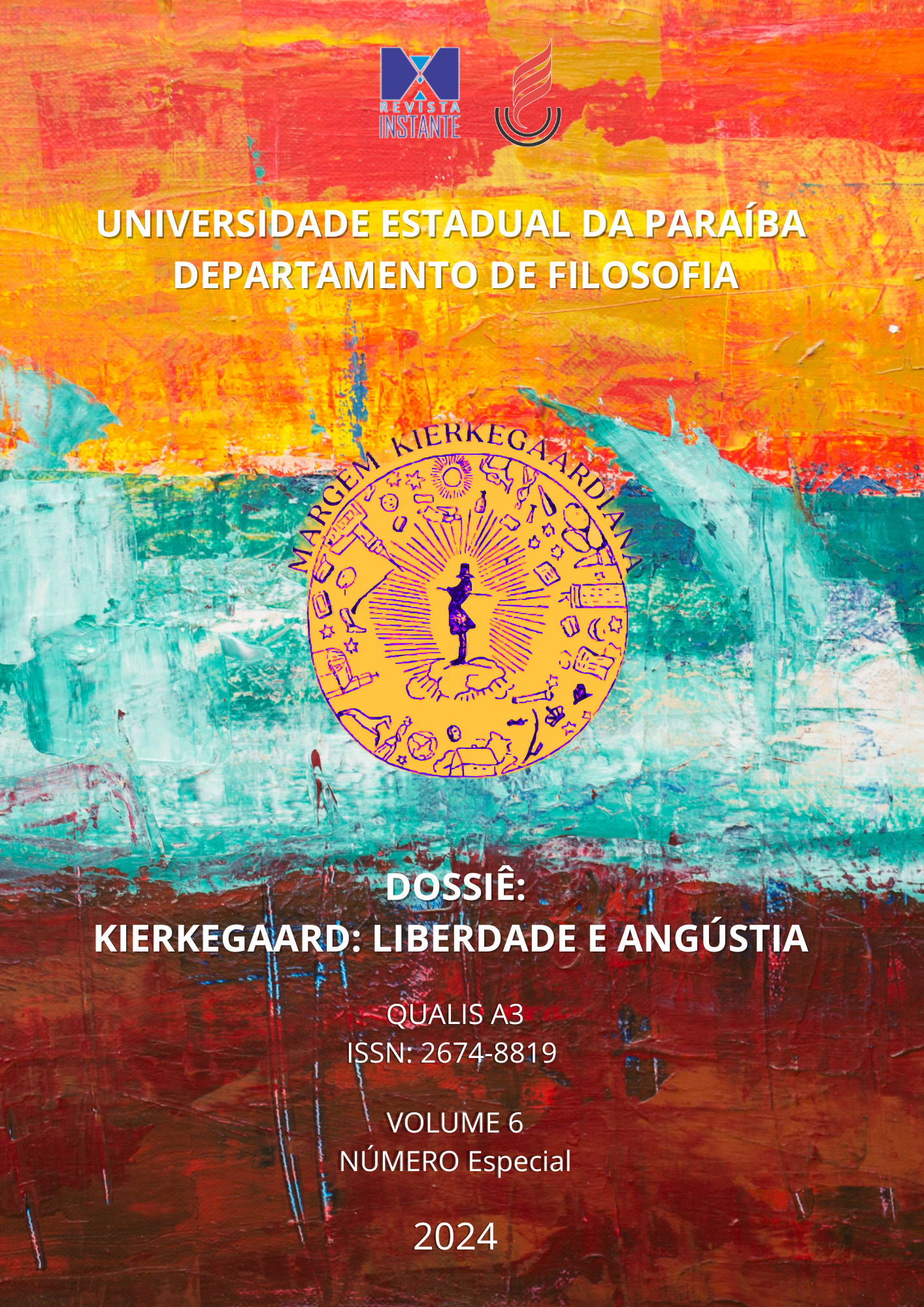NOTES ON AN EXISTENTIAL PSYCHOLOGICAL CLINIC INSPIRED ON KIERKEGAARD:
"EXPERIMENTING" PSYCHOLOGY AND ITS WAYS TO SEE ON THE FRINGES
Keywords:
Existential analysis. Kierkegaard. Anguish. Experimenting Psychology. Existential Psychological clinic.Abstract
To Kierkegaard, under the pseudonym of Vigilius Haufniensis (1844), Psychology would be by excellence the “Science” to confront the issue of anguish as an opening to the possibility upon an existential and ambiguous movement of existence itself. In opposition to Ethics – which acts and judges according to the Law – and to Dogmatics – which determines and enforces –, Psychology probes, observes and contemplates, drawing near to the experience, not trying to search for explanations nor foundations where to settle its ground rules. Unlike traditional scientific Psychology, that moves technical-disciplinary field, it is an experimenting psychology, as already suggested by authors who look for this connection between Psychology and Kierkegaard Philosophy (such as Protásio, Feijoo, Campos, etc.). That drawing near to the concrete experience is particularly necessary on the current historical moment when there is a reification of biomedical, organicist and globalizing approaches in the psychological sciences that, specifically in the field of Psychology, have been called Evidence-based Practices. In opposition to what is “straightforward”, what can be “seen from the outside”, the “evidences”, etc., that are essential ideas to modern scientific disciplines, Psychology inspired on Kierkegaard claims the seeing (e-videre) that is beyond observation, which is born on the fringes of its own existence and doesn’t seek any centrality. Therefore, we have brought reflections about the relevance of psychological clinic inspired on Kierkegaard on the current historical moment mainly from the concept of anguish, bringing some topics from the short story “Nas águas do tempo”, by Mia Couto, as a fringe of experience to meditate over the possibility of a current experimenting Psychology.
References
AMERICAN PSYCHIATRIC ASSOCIATION. Diagnostic and Statistical Manual of Mental Disorders, Fifth Edition (DSM-5). Washington, DC: American Psychiatric Press, 2013.
__________. Diagnostic and Statistical Manual of Mental Disorders, Third Edition (DSM-III). Washington, DC: American Psychiatric Press, 1980.
BALTES, Froukje; COOK, Joan M; VAN KORDENOORDT, Maaike; SOBCZAK, Sjacko. Psychiatric comorbidities in older adults with posttraumatic stress disorder: A systematic review. International Journal of Geriatric Psychiatry, v. 38, n. 6, pp. 1-15, jun 2023.
BARROS, Ricardo Paes de; SANTOS, Daniel D.; COUTINHO, Diana; SOARES, Camila M. M. Evidência: o que é, para que serve e como ir da que temos para a que queremos? Instituto Ayrton Senna, Núcleo Ciência para a Educação, 2020. Disponível em: <https://www.insper.edu.br/wp-content/uploads/2020/08/Escada-da-Evid%C3%AAnciaEvidc
%AAncia_-o-que-%C3%A9-para-que-serve-e-como-ir-da-que-temos-para-a-quequeremos_-.pdf>. Acessado em: janeiro de 2024.
BEUTLER, Larry E. Identifying empirically supported treatments: what if we didn’t? Journal of Consulting and Clinical Psychology, v. 66, n. 1, pp. 113-120, 1998.
CAMBAÚVA, Lenita Gama; SILVA, Lucia Cecilia da; FERREIRA, Walterlice. Reflexões sobre o estudo da história da psicologia. Estudos de Psicologia, v. 2, n. 3, pp. 207-227, 1998.
CAMPOS, Eduardo da Silveira. Psicologia de Kierkegaard: um jeito de ver à margem. In: FEIJOO, Ana Maria Lopez Calvo de.; PROTASIO, Myriam Moreira. Angústia e Repetição: da Filosofia à Psicologia. Rio de Janeiro: IFEN, 2014.
__________. Aprender a angustiar-se na paciência. Arquivos do IPUB online, Rio de Janeiro, v. 1, n. 1, pp. 88-101, jan./abr. 2019.
COUTO, Mia. Nas águas do tempo. In: COUTO, Mia. Estórias Abensonhadas, São Paulo: Companhia das Letras, 1994.
DE-LA-TORRE-UGARTE-GUANILO, Mônica Cecilia; TAKAHASHI, Renata Ferreira; BERTOLOZZI, Maria Rita. Revisão sistemática: noções gerais. Revista da Escola de Enfermagem da USP, v. 45, n. 5, pp. 1260-1266, 2011.
FEIJOO, Ana Maria Lopez Calvo de. A escuta e a fala em psicoterapia: uma proposta fenomenológico-existencial. São Paulo: Vetor, 2000.
__________. Os fundamentos da clínica psicológica na filosofia de Søren Kierkegaard. Revista da Abordagem Gestáltica, v. XIII, n. 1, pp. 111-124, 2007.
__________. A crise da subjetividade e o despontar das psicologias fenomenológicas. Psicologia em Estudo, Maringá, v. 16, n. 3, pp. 409-417, 2011.
__________. A experiência do pensamento para além da filosofia e da psicologia. Anais XIV Jornada Internacional de Estudos de Kierkegaard da Sobreski: o silêncio da solidão – tornar-se singular em Kierkegaard. Rio de Janeiro, 2015.
__________. Existência e psicoterapia: da psicologia sem objeto ao saber-fazer na clínica psicológica existencial. Rio de Janeiro: IFEN, 2017.
FEIJOO, Ana Maria Lopez Calvo de.; MATTAR, Cristine Monteiro; FEIJOO, Elaine Lopez; LESSA, Maria Bernadete Medeiros; PROTASIO, Myriam Moreira. O pensamento de Kierkegaard e a clínica psicológica. Rio de Janeiro: Edições IFEN, 2013.
FEIJOO, Ana Maria Lopez Calvo de; PROTASIO, Myriam Moreira. Análise existencial: uma psicologia de inspiração kierkegaardiana. Arquivos Brasileiros de Psicologia, Rio de Janeiro, v. 63, n. 3, pp. 72-88, 2011a.
__________. O resgate do caráter estético da existência na filosofia de Kierkegaard. Revista Filosofia Capital, v. 6, pp. 11-22, 2011b.
HASLAM, Nick. Reliability, validity, and the mixed blessings of operationalism. In: KENDLER, Kenneth S.; PARNAS, Josef. (Orgs.). Philosophical issues in psychiatry IV: psychiatric nosology. USA: Oxford University Press, 2017.
KIERKEGAARD, Søren Aabye [1844]. O conceito de angústia. Petrópolis: Editora Vozes, Bragança Paulista: Editora universitária São Francisco, 2020.
LEONARDI, Jan Luiz; MEYER, Beatriz. Prática baseada em evidências em psicologia e a história da busca pelas provas empíricas da eficácia das psicoterapias. Psicologia: ciência e profissão, v. 35, n. 4, pp. 1139-1156, 2015.
MAYES, Rick; HORWITZ, Allan V. DSM-III and the Revolution in the classification of mental illness. Journal of the History of the Behavioral Sciences, v. 41, n. 3, pp. 249-267, 2005.
ORGANIZAÇÃO MUNDIAL DA SAÚDE. Classificação Estatística Internacional de Doenças e Problemas Relacionados à Saúde – CID - 10, 2007.
PALUDO, Simone dos Santos; KOLLER, Sílvia Helena. Psicologia Positiva: uma nova abordagem para antigas questões. Paidéia, v. 36, n. 17, pp. 9-20, 2007.
PONDÉ, Milena Pereira. A crise do diagnóstico em psiquiatria e os manuais diagnósticos. Revista Latinoamericana de Psicopatologia Fundamental, São Paulo, v. 21, n. 1, pp. 145-166, mar. 2018.
PROTASIO, M. M. Contribuições Kierkegaardianas para a compreensão do adoecimento psíquico. In: FEIJOO, A. M. C. de (Org.). Interpretações Fenomenológico-Existenciais para o Sofrimento Psíquico na Atualidade. Rio de Janeiro: Edições IFEN, pp. 1-34, 2008.
__________. Reflexões sobre as bases para a edificação de uma psicologia kierkegaardiana. Estudos e Pesquisas em Psicologia, Rio de Janeiro, v. 12, n. 3, pp. 817-832, 2012.
SAMPAIO, RF; MANCINI, RC. Estudos de revisão sistemática: um guia para síntese criteriosa da evidência científica. Revista Brasileira de Fisioterapia, São Carlos, v. 11, n. 1, pp. 83-89, jan/fev. 2007.
SANDERSON, William C. Behavior Modification, v. 27, n. 3, pp. 290-299, jul. 2003.
Sites acessados:
ETIMOLOGIA- ORIGEM DO CONCEITO. Disponível em:
ncia>. Acessado em: abril 2023.
ORIGEM DA PALAVRA. Disponível em: . Acessado em: abril 2023.










